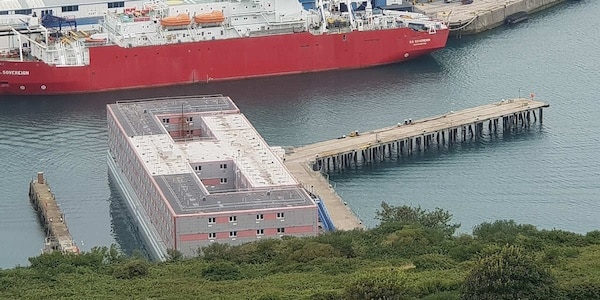On the 19th October 2023, a group of Just Stop Oil activists blocked a bus transporting asylum seekers to the Bibby Stockholm, a three-storey barge moored off the Isle of Portland in Dorset on which the Home Office plans to house hundreds of asylum seekers as they wait for their claims to be processed. In a repeat of incidents seen across the country, the bus drove into the protesters, forcing them to move.
Later, in Portland, the people on the bus were greeted by a small group of locals welcoming them to the town while at the same time protesting about their predicament. A Just Stop Oil spokesperson framed the action as a manifestation of the struggle for climate justice:
There is no climate justice without justice for all people… When we take action against the Bibby Stockholm, we’re taking action to defend people’s right to move safely with dignity.
As Andreas Malm and the Zetkin Collective research group into the far right have observed, there is a tendency to view the climate crisis as a rallying moment for the world, as it faces a threat to the survival of humanity as a species. However, this is a false hope. The far right is almost universally opposed to action on climate change; indeed, it is squarely lined up behind the fossil fuel industry. In any case, there are still trillions of dollars of oil reserves left in the world to be extracted, and fossil capital will seek to further existing political alliances with the right in order to maximise profits.
Climate denial and the far right
The incident that took place on the road to Portland is indicative of a broader trend of convergence that brings together the far right (manifest in its governmental, movement and terrorist forms) and the climate crisis. Intersections between these two points of seemingly separate politics are likely to increase in frequency and intensity as the crisis develops.
The escalation, diversification and broadening of the climate crisis is particularly concerning as fascism, in both its historical and contemporary forms, feeds off popular anxieties produced by crises. At the same time, it aligns itself with particular sections of capital to further its project. We can therefore expect to see the far right align itself with sections that will exacerbate the climate crisis, while also using the consequences of the crisis to stoke nationalist sentiments and further intensify border regimes.
Outright denial of a change in the climate has become rarer on the far right. However, other forms of denial, such as impact denialism, which denies the seriousness of the effects of the crisis, and, even more insidious, urgency denial, arguing that action is only needed some time in the future, have continued to carve out space for fossil fuel extraction.
In Germany, the far right Alternative für Deutschland is implacably opposed to climate action, calling in 2020 for an ‘exit plan from Germany’s coal exit’ and withdrawal from the Paris climate agreement, following the lead of the Donald Trump administration. On a governmental level, the climate struggle will necessarily involve a transnational struggle against the far right.
Ecofascism
The climate crisis also presents opportunities for the far right to further its political agenda. As the crisis entrenches, some parts of the world will become increasingly inhospitable to human life, forcing people to move in large numbers. Here, climate struggles will increasingly intersect with the fight for a just transition for all–and against militarized borders, authoritarianism and an entrenchment of existing global systems of racial domination.
In its movement form, the far right has intermeshed with national border policing, including in recent times the Defend Europa boat that was positioned for a summer in the Mediterranean. A real danger may arise in not only how the far right uses increased climate-induced migration as fuel for its politics but also in more explicit alliances with neoliberal border regimes.
There are other scenarios, however, where fascism and environmentalism can come together to construct a more explicit eco-fascist politics, in contrast to climate denialism. The far right can hold contradictory positions on the climate crisis not only because of fascism’s inherent irrationality, but also because it is diverse in its ideology and practices.
Climate struggles will increasingly intersect with the fight for a just transition for all
In the manifesto of the Christchurch mosque shooter, who slaughtered 51 Muslim worshippers in New Zealand in 2019 and described himself as an eco-fascist, a Malthusian solution to the climate crisis comes through the mass murder of non-whites, who he claimed were having too many children for the planet to sustain.
Such a position is not yet widely argued on the movement or governmental far right, but its influence is present in the hostility to non-white life that pervades far-right politics. As the crisis escalates, ideas based on far-right ecologism and the solving of the climate crisis through racial violence could come to the fore.
How should we, as anti-fascists, climate activists and leftists, respond? As we see increasing convergences between far-right politics and the climate crisis, so too must we begin to bring together anti-fascism with movements for climate justice. This does not only mean defending climate movements from threats from the far right but recognising that any just climate transition will not be consensus based but will involve protracted struggle between broadly defined reactionary forces and those that would oppose them.
Lastly, the left more broadly must learn to adapt to the dizzying array of disasters and protracted crises that will come to the fore in the years to come. Only through organising against a far right willing to push the environment to the brink can we realise justice and, ultimately, a better world.
This article first appeared in Issue #242 Fighting Fascism.

